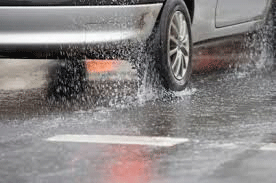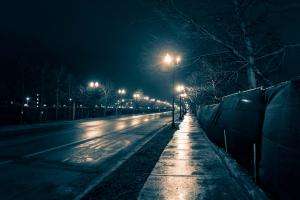
Staying safe at work this autumn
As the summer is rapidly changing to the colder and wetter conditions of autumn, many of us will be looking forward to staying indoors through the darker months.
However, for many workers, this is simply not an option. What’s more, with the change in weather comes a new set of risks – some which can be deadly. However, by following these simple steps, the risk to workers can be significantly reduced
In the rain
One of the biggest dangers in wet weather is that you are more likely to be injured by slips, trips and falls, with those working at height perhaps most at risk – 15% of all deaths from slips, trips and falls are from roofers alone yet they still have to go up on the wet roof.
So is there anything they can do to protect themselves?
One of the simplest measures to prevent this kind of accident is to choose appropriate clothing. The Health and Safety Executive (HSE) offers the following advice for those working in the cold and the rain:
- During bad weather, avoid boots or shoes with smooth soles and heels, such as plastic and leather soles. Instead, wear shoes or boots that provide traction; boots made of non-slip rubber or neoprene with grooved soles are best.
- Wear a heavy, bulky coat that will cushion you if you should fall.
- Keep warm, but make sure you can hear what’s going on around you.
- If working outdoors during the day, wear sunglasses to help you see better and avoid hazards
Another consideration is to adapt the working environment to make it safer during wet weather.
Again, the HSE has some tips for keeping workers safe:
- When fitting external paved areas ensure that the material used will be slip resistant when wet.
- Discourage people from taking shortcuts over grass or dirt which are likely to become slippery when wet. Consider converting existing shortcuts into proper paths.
- On new sites, before laying paths, think about how pedestrians are likely to move around the site. Putting the path in the right place from the start may save you money in the long term.
- Many slip accidents happen at building entrances as people entering the building walk in rainwater. Fitting canopies of a good size over building entrances and in the right position can help to prevent this.
- If a canopy is not a possibility, consider installing large, absorbent mats or even changing the entrance flooring to one which is non-slip.
Finally, those driving in the rain should also be aware of the increased dangers posed by poor conditions. Stopping distances can double in the wet as the friction  in between the car’s tyres and the road surface is reduced.
in between the car’s tyres and the road surface is reduced.
In extreme conditions this can result in aquaplaning where the steering becomes unresponsive. If this happens ease off the accelerator and slow down gradually. Stopping distances can increase dramatically when a vehicle’s tyres have a shallow tread depth.
If your car has the legal minimum tread depth of 1.6mm it will take you an extra 8 metres to stop at 50mph in the wet compared to a car with 3mm. It’s therefore vital that you factor in the road conditions when calculating stopping distances, as well as checking your tyres regularly and keeping your vehicle correctly maintained. How often do you check your tyres?
In the dark
The clocks have gone back again, the mornings and evening will be noticeably darker. The decreased visibility poses a particular risk for those commuting to work, be it by foot, bike, or by car.
Here are some things to consider:
- Although you will most likely want to wrap up warm, make sure your clothing doesn’t block your vision or make it hard for you to hear traffic.
- Wear a bright scarf or hat or reflective gear so drivers can see you.
- Don’t wear rain gear or vests that have become dull or are no longer reflective.
- If driving, ensure you are familiar with vehicle controls. Remember, it is illegal to drive at night without fully functioning front and rear lights.

- You should also check that all lights on the car are in full working order and kept clean before you start a journey.
- In darkness it is harder to judge speed and distance, objects can be closer than they appear or travelling faster than first expected. To prepare yourself for any eventuality you should drive at a speed that allows you to spot hazards and react accordingly.
Problems for those working indoors
So you work indoors, say in a nice warm office, so surely you don’t have to worry too much about the change in seasons do you?
Well actually there are many risks and problems that you need to consider.
With the colder weather comes the need to put on the heating in the office. This can cause disagreements amongst staff members, with some wanting it hotter than others. Then of course, there are the associated health problems that seem to be part and parcel of this time of year.
Sharing an office with employees and co-workers can be a disaster when it comes to spreading sickness, especially as the winter rolls around and windows are kept firmly shut. So it pays to know how to prevent office sickness.
Listed below are some simple tips to preventing office sickness:
- Always wash your hands. The best way to prevent office sickness and stop spreading infections to everything you touch is by washing your hands thoroughly throughout the day. Keep a bottle of hand sanitiser on your desk so you can do this without having to constantly pop to the bathroom. Also ensure you are cleaning your hands properly after using the toilet, blowing your nose or preparing food.
- Keep everything clean. As well as keeping your hands clean, it’s important to clean your desk frequently. This includes your keyboard, which some studies have found carry levels of bacteria five times more than those found in a toilet. With this in mind, it’s gross to think so few of us actually clean our keyboards. Desk spaces should be cleaned thoroughly at least once a week. It’s also important not to leave any washing up on your desk or in the sink; make sure you are keeping on top of your dishes and washing them with soap and hot water straight after you have eaten. Encourage the whole office to keep themselves and their working spaces clean to help avoid those sick days!
- Stay hydrated throughout the day. Drinking water and keeping yourself hydrated is a great way to keep your body in full working order which will hopefully help it destroy any incoming nasty viruses and infections. Fizzy drinks and coffee will not do the job like water does as these liquids tend to dehydrate.
- Try not to touch your face. Hands are the main way in which illnesses are transferred from person to person in the office so try to avoid touching your face throughout your work day. Some studies have actually found that workers touch their face once every four minutes! If you can avoid touching your face during the day, the chances of you getting sick will be greatly diminished.
- Avoid those who are infected. It can be difficult to avoid those who have come into work even though they are sick but if you want to spared and don’t fancy being bedridden for a few days, it’s important to try and steer clear of those displaying any symptoms. If you notice that someone next to you is coughing a lot, with red eyes and tissues surrounding them, tell them to go home.
- If you are sick, don’t come in. The best way to ensure that sickness won’t spread throughout your office is to make sure you don’t go in when you’re sick. This isn’t an excuse to have more sick days; only do this if you are genuinely ill and you think you might be contagious. It may even be a good idea to book a few days off when you are ill to give yourself a break and let your body recuperate properly.
Of course, as an employer you may wish to arrange for your workforce to be offered a Flu Vaccine. Obviously you cannot force anyone to have a flu jab but if offered as a company wide initiative, you may find that you have a good uptake.
Seasonal affective disorder (SAD) is a type of depression that comes and goes in a seasonal pattern. It is a recognized illness that could affect some of your workforce. SAD is sometimes known as “winter depression” because the symptoms are usually more apparent and more severe during the winter.
The exact cause of SAD isn’t fully understood, but it’s often linked to reduced exposure to sunlight during the shorter autumn and winter days.
The main theory is that a lack of sunlight might stop a part of the brain called the hypothalamus working properly.
Obviously it is up individuals to speak to their own doctor if they feel that they are affected but there are some things that you can do to help reduce the problem.
- Promote your staff getting as much natural sunlight as possible during their breaks.
- Fitting your office lighting with “Natural Light” bulbs and fittings. A notable treatment for these symptoms is the use of full spectrum daylight tubes that can adequately mimic the quality and spectrum of light provided by natural daylight.
If you would like any further help or support, please please contact us by phone 01458 253682, email or via our Facebook page or by Twitter.
